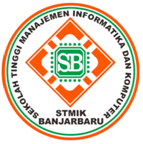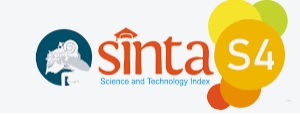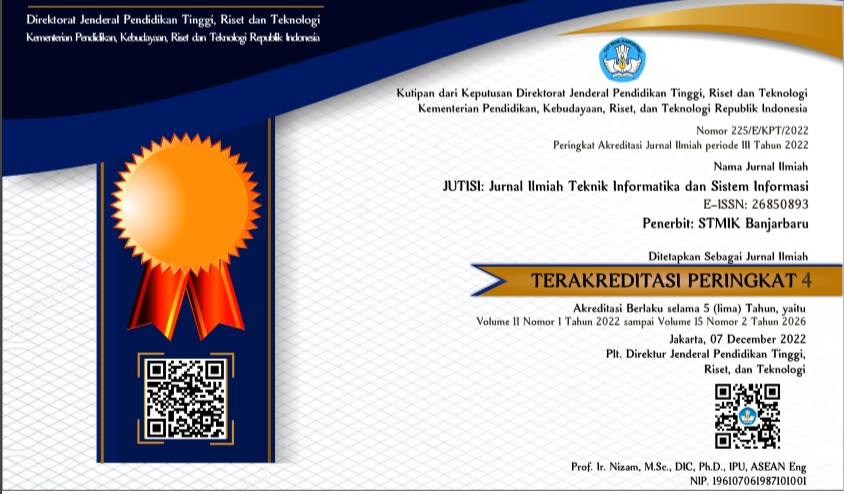Desain Strategi Pembelajaran Online Collaborative Dengan Tools Collaborative Online Pada Learning Management System
Abstract
Abstrak. Keterbatasan waktu belajar yang ditetapkan dalam desain kurikulum Mata kuliah Algoritma Pemrograman, terutama waktu berinteraksi secara tatap muka langsung, serta situasi Pandemi Covid 19 yang mengharuskan pembatasan aktivitas pertemuan langsung dalam pembelajaran di Laboratorium, menyebabkan mahasiswa kesulitan menyelesaikan seluruh materi pembelajaran yang telah direncanakan. Artikel ini bertujuan untuk menyajikan desain strategi pembelajaran online secara berkolaborasi dengan memanfaatkan tools Collaborative Online pada Learning Management System (LMS), yaitu gabungan aplikasi Moodle sebagai LMS dan aplikasi Zoom untuk tatap maya. Desain strategi pembelajaran dikembangkan menggunakan metode Research and Developmen, dengan mengintegrasikan tahapan awal pada model Borg & Gall dengan keseluruhan tahapan pengembangan dalam model Dick and Carey. Evaluasi desain dilakukan dengan uji formatif yang melibatkan pakar desain instruksional, pakar materi, pakar Bahasa, pakar desain dan media, evaluasi one-to-one dengan 3 orang mahasiswa, evaluasi kelompok kecil dengan 9 mahasiswa, serta uji coba kelompok besar dengan 20 mahasiwa, sedangkan efektivitas strategi desain pembelajaran dinilai menggunakan soal-soal pada Pre-test dan Post-test. Hasil Pre-test dan Post-test menunjukkan peningkatan hasil belajar sebesar 49,4%. Temuan lain menunjukkan bahwa desain strategi pembelajaran yang dikembangkan juga dapat membangkitkan semangat mahasiswa untuk bekerja secara berkolaborasi dalam menyelesaikan tugas-tugas, sebagai upaya untuk pencapaian tujuan pembelajaran.
Kata kunci: Online collaborative learning, Algoritma pemrograman, Learning management system, Uji formatif, Uji Efektivitas
 Abstract. The limited study time stipulated in the curriculum design for the Programming Algorithm Course, especially when interacting face-to-face, as well as the Covid-19 Pandemic situation which requires limiting direct meeting activities in laboratory learning, causes students to have difficulty completing all planned learning materials. This article aims to present a collaborative online learning strategy design by utilizing Collaborative Online tools on the Learning Management System (LMS), which is a combination of the Moodle application as an LMS and the Zoom application for virtual face-to-face. The design of the learning strategy was developed using the Research and Development method, by integrating the initial stages in the Borg & Gall model with all stages of development in the Dick and Carey model. The design evaluation was carried out with a formative test involving instructional design experts, material experts, language experts, design and media experts, one-to-one evaluation with 3 students, small group evaluation with 9 students, and large group trials with 20 students. while the effectiveness of the learning design strategy was assessed using questions in the Pre-test and Post-test. The results of the Pre-test and Post-test showed an increase in learning outcomes by 49.4%. Other findings indicate that the design of learning strategies developed can also inspire students to work collaboratively in completing assignments, as an effort to achieve learning objectives.
Keywords: Online collaborative learning, programming algorithm, Learning management system, formative test, effectiveness test
References
Smaldino SE, Lowther DL, Russel JD. Instructional technology and media for learning. Boston: Pearson, 2015.
Richey RC. Encyclopedia of Terminology for Educational Communications and Technology [Internet]. 2013. Available from: http://link.springer.com/10.1007/978-1-4614-6573-7
Suparman MA. Desain Istruksional Modern. 4th ed. Sallama NI, editor. Jakarta: Erlangga, 2014.
Chaeruman UA. Panduan Memilih dan Menentukan Setting Belajar Dalam Merancang Pembelajaran Blended. 2019.
Milla H, Yusuf E, Suharmi, Zufiyardi, Efendi R, Annisa A. Analysis of the Implementation of Online Learning During Covid-19 International Journal of Multicultural and Multireligious Understanding Analysis of the Implementation of Online Learning During Covid-19. Int J Multicult multireligious Underst. 2021;8(4):538–44.
Xhelili P, Ibrahimi E, Rruci E, Sheme K. Adaptation and Perception of Online Learning during COVID-19 Pandemic by Albanian University Students. Int J Stud Educ. 2021; 3(2): 103–111.
Hussein E, Daoud S, Alrabaiah H, Badawi R. Exploring undergraduate students’ attitudes towards emergency online learning during COVID-19: A case from the UAE. Child Youth Serv Rev [Internet]. 2020;119(November):105699. Available from: https://doi.org/10.1016/j.childyouth.2020.105699
Jusuf H. Dampak Model Pembelajaran Online Menggunakan Moodle untuk Mata Kuliah Desain Grafis di Era Covid-19. Jutisi: Jurnal Ilmiah Teknik Informatika dan Sistem Informasi, 2021;10(1):67–74.
[Hakim L. Pemilihan Platform Media Pembelajaran Online Pada Masa New Normal. Justek J Sains dan Teknol. 2020;3(2):27.
Bri D, GarcÃa M, Coll H, Lloret J, Vera C. A Study of Virtual Learning Environments. WSEAS Trans Adv Eng Educ. 2009;6(1):33–43.
Äorić BD, Blagojević M, Papic M, Stanković N. Students ’ Attitudes Regarding Online Learning During Covid-19 Pandemic. Int Conf Inf Technol Dev Educ [Internet]. 2020;(451). Available from: https://www.researchgate.net/publication/347464160
Wangdi N, Dema Y, Chogyel N. Evaluating the challenges in online learning during the COVID-19 pandemic in a middle secondary school. Int J Didact Stud. 2021;2(2):0–9.
Akuratiya D., Meddage DN. Students’ perception of online learning during the COVID-19 pandemic: A survey study of Polish medical students. Int J Reseach Innov Sos Sci. 2020;IV(IX):755–8.
Thandevaraj EJ, Gani NAN, Nasir MKM. A Review of Psychological Impact on Students Online Learning during Covid-19 in Malaysia. Creat Educ. 2021;12(06):1296–306.
Budiman E. Mobile Data Usage on Online Learning during Covid-19 Pandemic in Higher Education. Int J Interact Mob Technol. 2020;14(19):4–16.
Aziza M. Online Learning during Covid-19: What is the Most Effective Platform for Teaching and Learning Mathematics? Edumatika J Ris Pendidik Mat. 2021;4(1):166–78.
Dangal MR, Maharjan R. Health Problems Experienced in Online Learning During COVID-19 in Nepali Universities. Int J Online Grad Educ [Internet]. 2021;4(1):0–14. Available from: http://www.ijoge.org/index.php/IJOGE/article/view/48
Ha TM. The challenges and opportunities of online learning during Covid-19 pandemic. 2021;(June).
Almahasees Z, Mohsen K, Amin MO. Faculty’s and Students’ Perceptions of Online Learning During COVID-19. Front Educ. 2021; 6.
Pallathadka H. A Survey Of Undergraduate Students On Online Learning During Covid-19 Pandemic In The Indian State Of Manipur. 2021;(September).
[Nambiar D. The Impact of Online Learning: Student’s Views. Int J Indian Psychol. 2020; 8(2): 57-61
Ahmed Masud N, Nesa Suborna T. Impact of online Learning during Covid-19-a Study of Rural Area in Bangladesh. Int J Creat Res Thoughts [Internet]. 2021;9(March):2320–882. Available from: www.ijcrt.org
Mukhtar K, Javed K, Arooj M, Sethi A. Advantages, limitations and recommendations for online learning during covid-19 pandemic era. Pakistan J Med Sci. 2020;36(COVID19-S4):S27–31.
Khan SA, Zainuddin M, Mahi M, Arif I. Behavioral intention to use online learning during COVID-19 : An analysis of the technology acceptance model. Int Conf Innnovative Methods Teach Technol Adv High Educ [Internet]. 2020;(December):3–12. Available from: https://www.researchgate.net/publication/348047664_Behavioral_Intention_to_Use_Online_Learning_During_COVID-19_An_Analysis_of_the_Technology_Acceptance_Model
Faize FA, Nawaz M. Evaluation and Improvement of students’ satisfaction in Online learning during COVID-19. Open Prax. 2020;12(4):495.
Kimkong H, Koemhong S. Online learning during COVID-19: Key challenges and suggestions to enhance effectiveness. Cambodian Educ Forum [Internet]. 2020;(December):1–15. Available from: https://www.researchgate.net/publication/ 346719308_Online_learning_during_COVID 19_Key_challenges_and_suggestions_to_ enhance_effectiveness
Jhon W, Mustadi A, Zubaidah E. Online Learning during Covid-19 Pandemic in Developing Countries : Does it run well ? J Pendidik Progresif. 2020;10(3):440–454.
Alshehhi A, Mansoor W, Alshehhi A, Almulla H, Mansoor D. Impact of Artificial intelligence on Online Learning During COVID-19: A Framework. Psychol Educ [Internet]. 2021;58(2). Available from: http://psychologyandeducation.net/pae/index. php/pae/article/view/3739
Zeng X, Wang T. College Student Satisfaction with Online Learning during COVID-19: A review and implications. Int J Multidiscip Perspect High Educ [Internet]. 2021;6(1):182–95. Available from: https://ojed.org/jimphe
Saadiah H, Wahid A. Are Students Engaging in Online Classrooms ? Eur J Educ Stud. 2020;7(2019):202–212.
Pasaribu TA, Dewi N. Indonesian EFL students’ voices on online learning during COVID-19 through appraisal analysis. Learn J Lang Educ Acquis Res Netw. 2021;14(1):399–426.
Feldman J. An ethics of care: PGCE students’ experiences of online learning during covid-19. Crit Stud Teach Learn. 2020;8(2):1–17.
Thomas M. Digital Education: Opportunities for Social Collaboration. 2011;282. Available from: https://books.google.com/books?hl=en&lr=&id=pXDHAAAAQBAJ&pgis=1
Jusuf H. Penggunaan Gamifikasi dalam Proses Pembelajaran. J TICOM. 2016;5(1):1–6.
Smaldino SE, Lowther DL, Mims C, Russell JD. Instructional Technology and Media for Learning. Eleventh. USA: Pearson; 2015.
Davis IK. Pengelolaan Belajar. Jakarta: Rajawali; 1991.
Widoyoko SEP. Evaluasi Program Pembelajaran : Panduang Praktis bagi Pendidik dan calon pendidik. X. Yogyakarta: Pustaka Pelajar; 2019.
How To Cite This :
Refbacks
- There are currently no refbacks.











